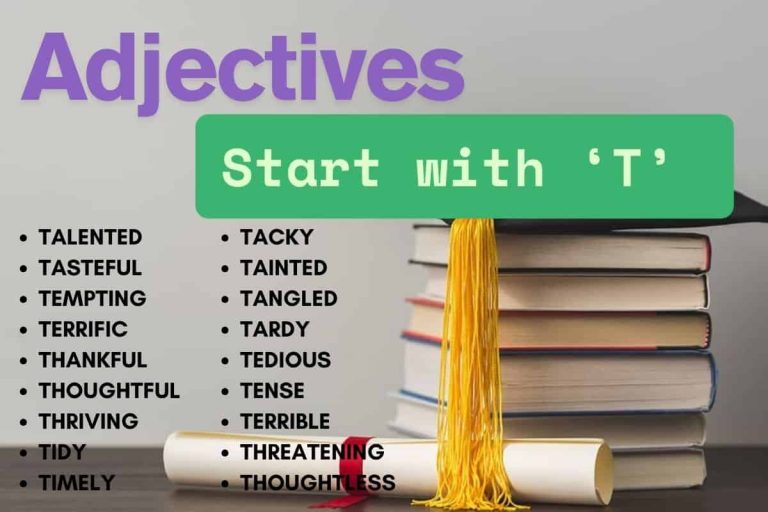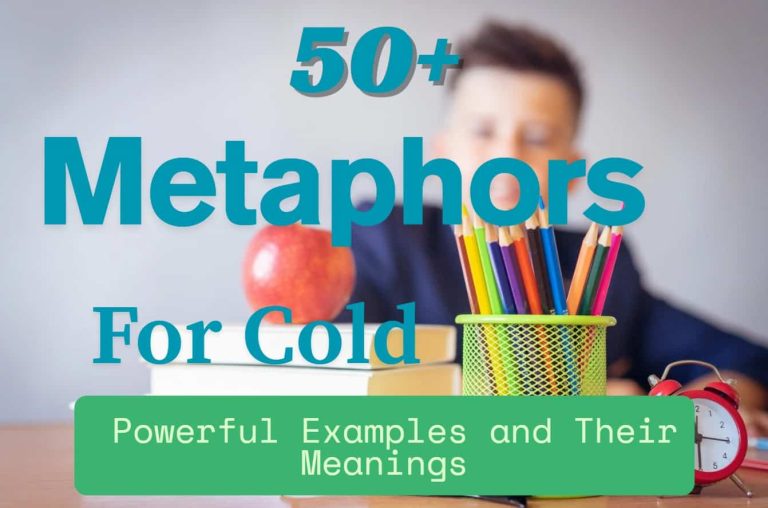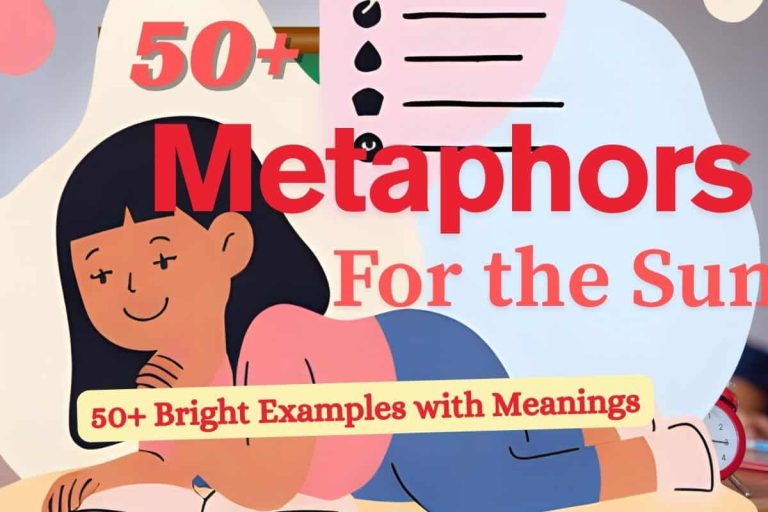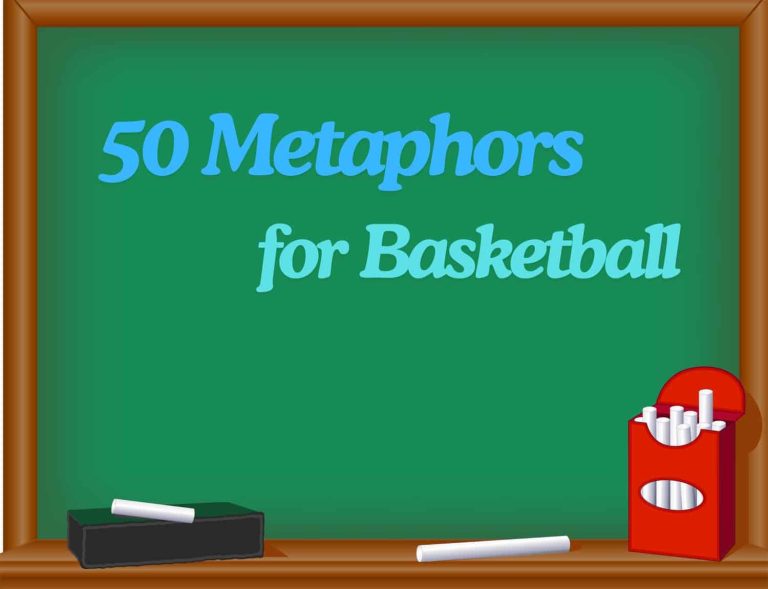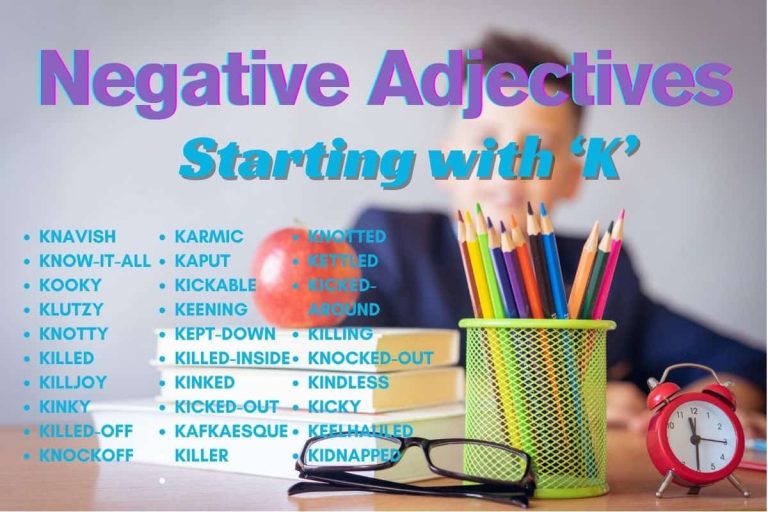50+ Critical and Negative Adjectives Starting with ‘F’ Words
Negative adjectives are essential for expressing disapproval, criticism, or the absence of desirable qualities. Negative Adjectives Starting with ‘F’ carry significant weight, often conveying strong and impactful meanings.
I will delve into the intricacies of these adjectives, offering numerous examples and practical exercises to solidify your understanding. By the end of this article, you will be equipped to use these words confidently and effectively, avoiding common pitfalls and embracing the power of precise language.
This article provides a comprehensive guide to negative adjectives starting with “f,” exploring their structural characteristics, various categories, standard usage rules, frequent mistakes, and advanced applications.
Definition of Negative Adjectives Starting with ‘F’
Negative adjectives are words that describe nouns with unfavorable or undesirable qualities. Specifically, negative adjectives starting with “f” are those that begin with the letter “f” and denote a lack of positive attributes or the presence of negative ones.
These adjectives serve to express disapproval, criticism, or the absence of something desirable. They function to modify nouns, providing more specific and often unflattering details about them.
Structural Breakdown:
The structure of negative adjectives starting with “F” is similar to that of other adjectives in English. They typically consist of a root word and may sometimes include prefixes or suffixes contributing to their negative connotation.
Here’s a breakdown of common structural elements:
- Root Word: The core of the adjective, often a noun or verb.
- Prefixes: These can intensify or modify the meaning. Common negative prefixes are not usually seen with “f” adjectives.
- Suffixes: Suffixes like “-ish” (foolish) can create adjectives denoting a tendency towards the root word’s meaning. Suffixes like “-less” (faithless) create adjectives denoting a lack of the root word’s meaning.
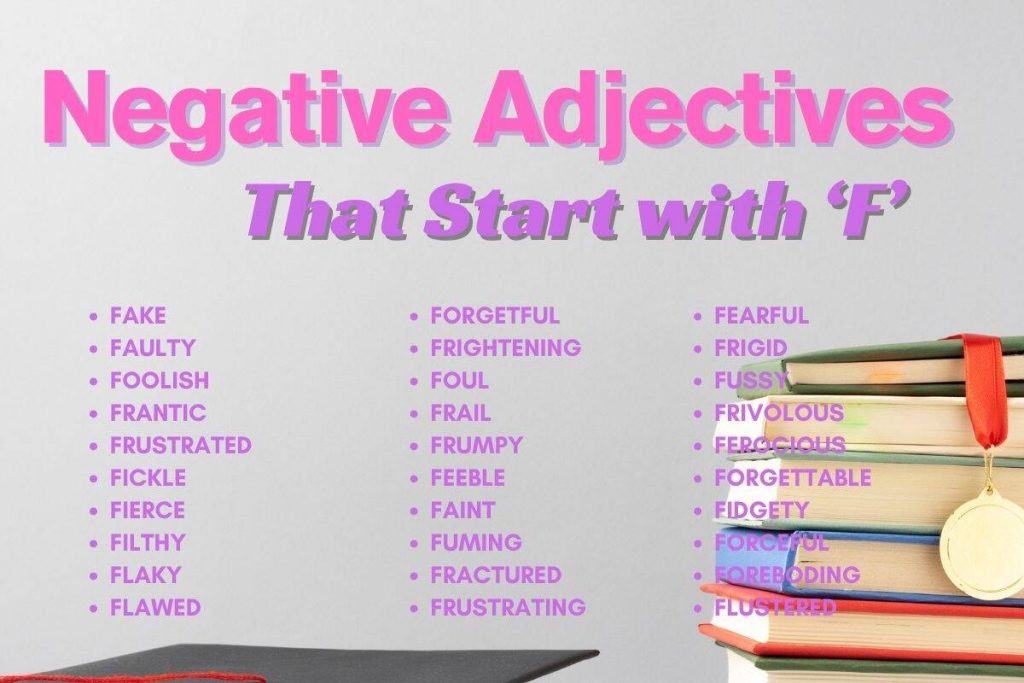
Examples List of Negative Adjectives That Start with ‘F’
Negative adjectives starting with “f” can be categorized based on the specific type of negativity they convey. Some examples will help you understand how these adjectives function in different contexts.
Examples of Character Flaws
These adjectives describe negative aspects of a person’s character or behavior. They often highlight undesirable traits such as dishonesty, unreliability, or lack of integrity.
Examples include: fickle, fiendish, foolish, fraudulent, faithless, fastidious (when overly critical).
| Adjective | Definition | Example Sentence |
|---|---|---|
| Fickle | Changing frequently, especially regarding one’s loyalties or affections. | Her fickle nature made it difficult to rely on her promises. |
| Fiendish | Extremely cruel or unpleasant; devilish. | The villain devised a fiendish plan to take over the city. |
| Foolish | Lacking good sense or judgment; unwise. | It was foolish of him to invest all his money in such a risky venture. |
| Fraudulent | Obtained, done by, or involving deception, especially criminal deception. | The company was exposed for its fraudulent accounting practices. |
| Faithless | Disloyal; unfaithful. | He was a faithless husband who betrayed his wife’s trust. |
| Fastidious | Very attentive to and concerned about accuracy and detail (can be negative when excessive). | Her fastidious attention to detail bordered on obsessive. |
| Flippant | Not showing a serious or respectful attitude. | His flippant remarks during the serious discussion were inappropriate. |
| Fractious | Irritable and quarrelsome. | The fractious child was difficult to manage. |
| Frivolous | Not having any serious purpose or value. | She considered his concerns to be frivolous and unimportant. |
| Fawning | Displaying exaggerated flattery or affection. | The employee’s fawning behavior towards the boss was transparent. |
| Finicky | Fussy and difficult to please. | The finicky eater refused to try any new foods. |
| Forgetful | Apt to forget things. | The forgetful professor often misplaced his keys. |
| Feckless | Irresponsible; lacking initiative or strength of character. | His feckless approach to his finances led to disaster. |
| Fallible | Capable of making mistakes or being wrong. | As humans, we are all fallible and prone to error. |
| Fanatical | Marked by excessive enthusiasm and often intense uncritical devotion. | The fanatical supporter took his love for the team too far. |
| Fatalistic | Believing that all events are predetermined and therefore inevitable. | His fatalistic attitude prevented him from taking action. |
| Furtive | Attempting to avoid notice or attention, typically because of guilt or a belief that discovery would lead to trouble; secretive. | His furtive glances made me suspicious of his intentions. |
| Fussy | Fastidious or difficult to please. | The fussy customer complained about every detail of the meal. |
| Foul-mouthed | Using offensive or obscene language. | The foul-mouthed comedian’s jokes were not well-received. |
| Fidgety | Restless; unable to stay still. | The fidgety student could not sit still during the exam. |
| Facetious | Treating serious issues with deliberately inappropriate humor; flippant. | His facetious remarks were inappropriate for the solemn occasion. |
| Feeble-minded | Intellectually weak; stupid. | It would be feeble-minded to believe such an obvious lie. |
| Ferocious | Savagely fierce, cruel, or violent. | The ferocious dictator ruled with an iron fist. |
| Formalistic | Excessively concerned with form or outward appearance. | The formalistic approach to education stifled creativity. |
| Forlorn | Pitifully sad and abandoned or lonely. | The forlorn child wandered the streets alone. |
| Frantic | Wild or distraught with fear, anxiety, or other emotion. | She was frantic with worry when her child went missing. |
Examples of Failure and Inadequacy
This category includes adjectives that denote a lack of success, competence, or effectiveness. They often describe things that are unsuccessful, insufficient, or lacking in quality.
The following table presents negative adjectives starting with ‘f’ that describe failure and inadequacy, accompanied by example sentences.
| Adjective | Definition | Example Sentence |
|---|---|---|
| Fallacious | Based on mistaken beliefs. | His argument was based on fallacious reasoning. |
| Faulty | Having defects; not working properly. | The faulty wiring caused a fire in the building. |
| Fatuous | Silly and pointless. | His fatuous remarks made everyone roll their eyes. |
| Feeble | Lacking physical strength, especially as a result of age or illness. | The old man’s feeble hands could barely hold the cup. |
| Fruitless | Failing to achieve the desired results; unproductive or useless. | Their efforts to find a solution proved fruitless. |
| Fumbling | Awkward in movement or handling things. | He made a fumbling attempt to catch the ball. |
| Floundering | Struggling or staggering clumsily in mud or water. | The company was floundering after the economic downturn. |
| Forfeit | Lost or surrendered as a penalty for wrongdoing or neglect. | The team had to forfeit the game due to a lack of players. |
| Futile | Incapable of producing any useful result; pointless. | It was futile to argue with him when he was so stubborn. |
| Faltering | Starting to lose strength or momentum. | Her voice was faltering as she delivered the emotional speech. |
| Failing | Not successful; performing badly. | The failing business was on the verge of bankruptcy. |
| Fragmented | Broken into pieces or incomplete. | The fragmented evidence made it difficult to solve the case. |
| Flat | Lacking interest or excitement. | The performance fell flat and failed to engage the audience. |
| Flawed | Having imperfections or defects. | The diamond was beautiful, but flawed with a tiny crack. |
| Fugitive | Running away or escaping from arrest or captivity. | The fugitive was wanted by the police for multiple crimes. |
| Fictitious | Not true or real; imaginary or fabricated. | The story was entirely fictitious and based on no real events. |
| Forgotten | No longer remembered. | The forgotten language was only spoken by a few people. |
| Formless | Having no definite form or shape. | The cloud was a formless mass in the sky. |
| Frozen | Unable to move or act due to fear or shock. | She was frozen with terror when she saw the snake. |
| Frustrated | Feeling or expressing distress and annoyance resulting from an inability to change or achieve something. | He was frustrated by his lack of progress on the project. |
| Functionless | Not performing or able to perform a regular function. | The machine was functionless due to the broken parts. |
| Frivolous | Lacking in seriousness or importance. | The lawsuit was dismissed as being frivolous. |
| Feigned | Simulated or pretended; insincere. | He offered a feigned apology that no one believed. |
| Falsified | Altered so as to mislead. | The documents were falsified to conceal the truth. |
| Filtered | Having been passed through a filter; often implies a reduction in quality or authenticity. | The article presented a filtered version of the truth. |
| Finished | No longer having any strength or energy left; exhausted. | After the marathon, she felt completely finished. |
Examples of Negative Physical Descriptions
These adjectives describe negative physical characteristics or conditions. They often highlight undesirable aspects of appearance, health, or environment.
The subsequent table provides negative adjectives starting with ‘f’ that describe negative physical characteristics, along with illustrative example sentences.
| Adjective | Definition | Example Sentence |
|---|---|---|
| Faded | Having lost freshness or intensity of color. | The faded curtains no longer matched the decor. |
| Fetid | Smelling extremely unpleasant. | The fetid odor from the garbage bin was unbearable. |
| Flimsy | Weak and insubstantial; easily damaged. | The flimsy cardboard box collapsed under the weight. |
| Foul | Offensive to the senses, especially through having a disgusting smell or taste or being dirty. | The foul smell indicated that something was rotten. |
| Frigid | Extremely cold. | The frigid temperatures made it difficult to stay warm. |
| Frightening | Causing fear or alarm. | The frightening thunderstorm kept us awake all night. |
| Frozen | Turned into ice or covered with ice. | The frozen lake was dangerous to walk on. |
| Filthy | Disgustingly dirty. | The filthy streets were covered in garbage. |
| Flat | Lacking depth or relief; boring. | The landscape was flat and uninteresting. |
| Foul-smelling | Having an unpleasant odor. | The foul-smelling swamp was avoided by most people. |
| Foul-tasting | Having an unpleasant flavor. | The medicine had a foul-tasting flavor that made it hard to swallow. |
| Flabby | (of a person’s body or part of it) soft, loose, and fleshy. | His flabby arms showed a lack of exercise. |
| Frowzy | Scruffy and neglected in appearance. | The frowzy old coat looked like it hadn’t been washed in years. |
| Fungal | Relating to or caused by a fungus. | The plant suffered from a fungal infection. |
| Faint | Barely perceptible. | The faint light was not enough to see by. |
| Feeble | Weak and frail. | The feeble old tree was about to fall. |
| Fissured | Having cracks or splits. | The fissured ground was evidence of an earthquake. |
| Foxed | (of paper or parchment) stained with brownish spots. | The antique book had foxed pages. |
| Frostbitten | Injured by freezing. | His frostbitten fingers were numb and painful. |
| Funereal | Having the mournful, somber character appropriate to a funeral. | The funereal atmosphere made everyone feel sad. |
| Fuzzy | Covered with a soft, fluffy surface. (Can be negative in the context of images) | The fuzzy photograph was difficult to make out. |
| Funky | Having a strong, unpleasant smell. | The old cheese had a funky odor. |
Usage Rules
When using negative adjectives starting with “f,” it is important to consider the context and the specific nuance of each word. Some general rules include:
- Placement: Adjectives typically precede the noun they modify (e.g., “the fraudulent scheme”).
- Subjectivity: Many negative adjectives are subjective, reflecting a personal opinion or judgment (e.g., “the foolish decision”).
- Intensity: Some adjectives are stronger than others (e.g., “foul” is stronger than “faded”).
- Formal vs. Informal: Some adjectives are more appropriate for formal contexts (e.g., “fallacious”) while others are more common in informal settings (e.g., “fussy”).
It’s also important to avoid redundancy. Using multiple negative adjectives to describe the same noun can sound awkward and repetitive.
Instead, choose the single adjective that best conveys the intended meaning.
Common Mistakes
One common mistake is confusing similar-sounding adjectives with different meanings. For example, “fatuous” (silly and pointless) is often confused with “facetious” (treating serious issues with inappropriate humor).
Another error is using an adjective inappropriately in a formal or informal context. Using slang or overly casual language in formal writing can undermine your credibility.
Here are some examples of common mistakes and how to correct them:
| Incorrect | Correct | Explanation |
|---|---|---|
| The facetious plan failed miserably. | The fatuous plan failed miserably. | “Fatuous” means silly and pointless, which is more appropriate in this context than “facetious,” which implies inappropriate humor. |
| He made a foul decision. | He made a foolish decision. | “Foul” generally refers to something offensive to the senses. “Foolish” is better suited for describing a bad decision. |
| The fickle building collapsed. | The flimsy building collapsed. | “Fickle” describes someone inconsistent, whereas “flimsy” describes something weak and insubstantial. |
Practice Exercises
To reinforce your understanding of negative adjectives starting with “f,” complete the following exercises.
Exercise 1: Fill in the Blanks
Fill in the blanks with the most appropriate negative adjective starting with “f” from the list below. Each adjective should be used only once.
Adjectives: fickle, fiendish, foolish, fraudulent, faithless, flimsy, fetid, fallacious, failing, flippant
| Question | Answer |
|---|---|
| 1. The detective uncovered a ________ scheme to embezzle millions from the company. | fraudulent |
| 2. The ________ walls of the old house were on the verge of collapse. | flimsy |
| 3. Her ________ loyalty made it impossible to trust her. | fickle |
| 4. The ________ logic of his argument was easily disproven. | fallacious |
| 5. It was ________ of him to drive after drinking so much alcohol. | foolish |
| 6. The ________ smell coming from the basement was alarming. | fetid |
| 7. The ________ student made light of the serious situation. | flippant |
| 8. The ________ company was on the brink of bankruptcy. | failing |
| 9. The ________ plot involved poisoning the entire city’s water supply. | fiendish |
| 10. He was a ________ husband, betraying his wife’s trust repeatedly. | faithless |
Exercise 2: Sentence Rewriting
Rewrite the following sentences using a negative adjective starting with “f” to replace the underlined phrase.
| Question | Answer |
|---|---|
| 1. The plan was based on beliefs that were not true. | The plan was based on fallacious beliefs. |
| 2. The smell was extremely unpleasant. | The smell was fetid. |
| 3. His actions were lacking good sense. | His actions were foolish. |
| 4. The structure was weak and insubstantial. | The structure was flimsy. |
| 5. The company’s practices involved criminal deception. | The company’s practices were fraudulent. |
| 6. The man was disloyal and unfaithful to his country. | The man was faithless to his country. |
| 7. The decision was silly and pointless. | The decision was fatuous. |
| 8. The attempt to fix the problem was not successful. | The attempt to fix the problem was fruitless. |
| 9. The weather was extremely cold. | The weather was frigid. |
| 10. His movements were awkward and clumsy. | His movements were fumbling. |
Exercise 3: Error Correction
Identify and correct the incorrect use of negative adjectives starting with “f” in the following sentences.
| Question | Answer |
|---|---|
| 1. The fatuous smell wafted from the garbage can. | The fetid smell wafted from the garbage can. |
| 2. His fickle attempt to fix the car failed. | His fumbling attempt to fix the car failed. |
| 3. Her fraudulent loyalty was always in question. | Her fickle loyalty was always in question. |
| 4. The flimsy argument was based on sound logic. | The fallacious argument was based on sound logic. |
| 5. It was fetid to invest all his money in that company. | It was foolish to invest all his money in that company. |
| 6. The foul business was on the verge of collapse. | The failing business was on the verge of collapse. |
| 7. The frightening plan involved stealing candy from babies. | The fiendish plan involved stealing candy from babies. |
| 8. The faithless weather made it difficult to stay warm. | The frigid weather made it difficult to stay warm. |
| 9. The fatuous walls of the house were about to crumble. | The flimsy walls of the house were about to crumble. |
| 10. He was a flippant husband who always kept his promises. | He was a faithless husband who always kept his promises. |
Frequently Asked Questions – FAQ
Here are some frequently asked questions about negative adjectives starting with “f”:
What is the difference between “fatuous” and “facetious”?
“Fatuous” means silly and pointless, lacking intelligence or substance. “Facetious” means treating serious issues with deliberately inappropriate humor. While both can be negative, “fatuous” implies a lack of intelligence, whereas “facetious” implies a lack of seriousness.
When is it appropriate to use the adjective “foul”?
“Foul” is used to describe something offensive to the senses, particularly smell or taste. It can also refer to something morally offensive or wicked. Use it when you want to emphasize the disgusting or morally reprehensible nature of something.
How can I avoid misusing negative adjectives starting with “f”?
Consult a dictionary or thesaurus to confirm the precise meaning of each word. Pay attention to the context in which you are using the adjective, and consider the potential connotations and implications. Read widely and observe how skilled writers use these words.
Are there any synonyms for “foolish” that are also negative adjectives starting with “f”?
While there isn’t a direct synonym that starts with “f” and has the exact same meaning, “fatuous” can sometimes be used as a synonym, though it carries a slightly different connotation of being silly and pointless rather than simply lacking good sense.
Is it ever appropriate to use multiple negative adjectives starting with “f” in the same sentence?
While grammatically correct, using multiple negative adjectives starting with “f” can often sound awkward or redundant. Choosing the single adjective that most accurately conveys the intended meaning is usually best. If you must use multiple adjectives, ensure they each contribute a distinct and necessary aspect to the description.
How do I know which negative adjective starting with “f” is the strongest?
The strength of a negative adjective is subjective and depends on the context. However, some adjectives like “fiendish” (extremely cruel) and “fraudulent” (involving deception) typically carry a stronger negative connotation than adjectives like “faded” (having lost color) or “feeble” (weak). Consider the impact you want to create when choosing an adjective.
What is the etymology of the word “fraudulent”?
The word “fraudulent” comes from the Latin word “fraus,” meaning deceit or trickery. This etymology helps understand the core meaning of the word as something involving deception or dishonesty.
How can I expand my vocabulary of negative adjectives starting with “f”?
Read widely, paying attention to how different authors use these adjectives. Use a dictionary and thesaurus to explore related words and their nuances. Practice using these words in your own writing and speaking. Consider creating flashcards or using vocabulary-building apps to reinforce your learning.
Conclusion
Mastering negative adjectives starting with “f” is crucial for precise and effective communication. Understanding their definitions, structural characteristics, various categories, and proper usage can enhance your vocabulary and avoid common mistakes.
Continue to expand your vocabulary and refine your understanding of English grammar. You can confidently and effectively express yourself in any situation with consistent effort and attention to detail.
Remember that language learning is an ongoing process, and every new word you master brings you closer to fluency and mastery.

